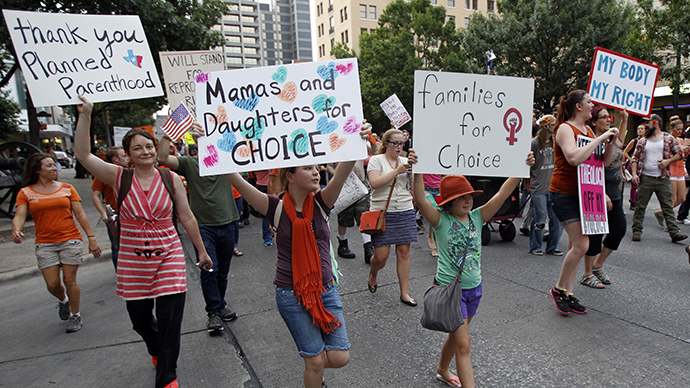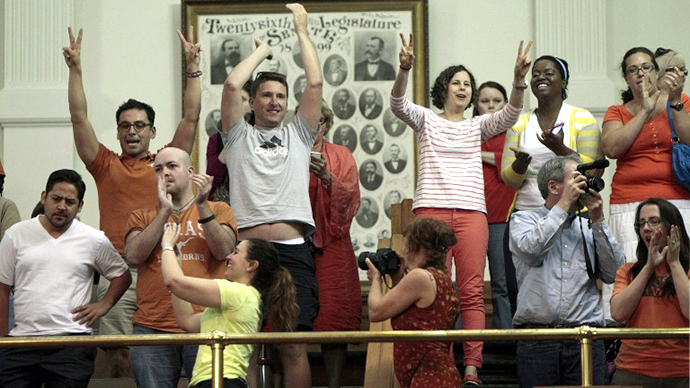Federal judge says hospital restriction in Texas abortion law unconstitutional

A federal judge declared Monday one provision of a new, divisive Texas anti-choice law is unconstitutional while adjusting another aspect of the July legislation that is set to go into effect Tuesday.
In his opinion, US District Judge Lee Yeakel said a provision
requiring doctors who perform abortions in Texas to have
admitting privileges at a hospital 30 miles or less from the
abortion facility "places a substantial obstacle in the path
of a woman seeking an abortion of a nonviable fetus and is thus
an undue burden to her.”
“The court expresses grave reservations about allowing a hodge podge of diverse medical committees and boards to determine, based solely on admitting privileges, which physicians may perform abortions,” wrote Yeakel, who was appointed by then-President George W. Bush, former Republican governor of Texas.
The state argued the admitting privileges requirement would improve patient care and would not place an undue burden on women seeking abortion care.
Yeakel amended, but did not outright block, another provision that requires women seeking abortions must follow 13-year-old US Food and Drug Administration (FDA) guidelines - rather than an evidence-based regimen, which is more common - for abortion medication except in cases when a physician’s judgment deems it is “necessary for the preservation of the life or health of the mother."
The judge said the FDA protocol is “assuredly more imposing and unpleasant for the woman, requiring at least one additional visit to a clinic and allowing less control over the timing and convenience of the medically induced miscarriage.” Nevertheless, Yeakel left the provision only partially altered.
Two additional parts of the law remain unchallenged: a requirement that abortion clinics meet the same standards as ambulatory surgical centers starting in September 2014, and a ban on abortions after 20 weeks of gestation. The latter aspect of HB2, approved by the state Legislature and signed by Gov. Rick Perry in July after a flurry of protests to block its passage, will still go into effect Tuesday, October 29, given the plaintiffs did not challenge it in their suit, filed in September.
Texas Attorney General Greg Abbott is expected to file an emergency appeal of Yeakel’s ruling to the 5th Circuit Court of Appeals, which has upheld many abortion-restrictive laws recently.
Yeakel himself alluded Monday to a likely appeal, saying the case could eventually reach the US Supreme Court.
“Today’s decision will not stop our ongoing efforts to protect
life and ensure the women of our state aren’t exposed to any more
of the abortion-mill horror stories that have made headlines
recently," Perry said in a statement. "We will continue
fighting to implement the laws passed by the duly-elected
officials of our state, laws that reflect the will and values of
Texans.”

The lawsuit was brought by major abortion and women’s health providers in the state, including four Planned Parenthood affiliates and Whole Woman’s Health, which runs abortion clinics in five Texas cities.
They argued that the hospital-admitting privileges and the abortion-drug provision placed an undue burden on women and were thus unconstitutional. They contend a third of abortion facilities in the state would not meet the hospital requirement which would likely lead to closures, leaving 22,000 without reasonable access to abortion care. They also said following the FDA-mandated schedule for abortion-inducing drugs is outdated and can put the well-being of women at risk.
In addition to supporting the hospital requirement, the Texas attorney general’s office argued that women should address the FDA, not the state of Texas, in challenging the drug rule.
“Today’s decision has averted a catastrophic health crisis for women across the state of Texas,” Center for Reproductive Rights President and CEO Nancy Northup said in a statement. “Politicians, not doctors, pushed for both of these unconstitutional restrictions—despite the best medical standards for women’s health care.”
Though while Amy Hagstrom Miller, CEO at Whole Woman’s Health, was “relieved” that the hospital provision was blocked, she said her organization is “disappointed that Judge Yeakel did not also block the severe restrictions on medication abortion.”
“Nearly 40 percent of the women we serve at Whole Woman’s Health choose medication abortion and now Texas is preventing these women from the advances in medical practice that other women across the United States will be able to access,” said Hagstrom Miller.
House Bill 2 passed in a third special legislative session called by Republican Gov. Perry after a previous effort was blocked via a successful 13-hour filibuster by State Sen. Wendy Davis (D), who has since declared she is running for governor. In a political twist, her likely opponent to replace the outgoing Perry is Attorney General Abbott, also a Republican.















